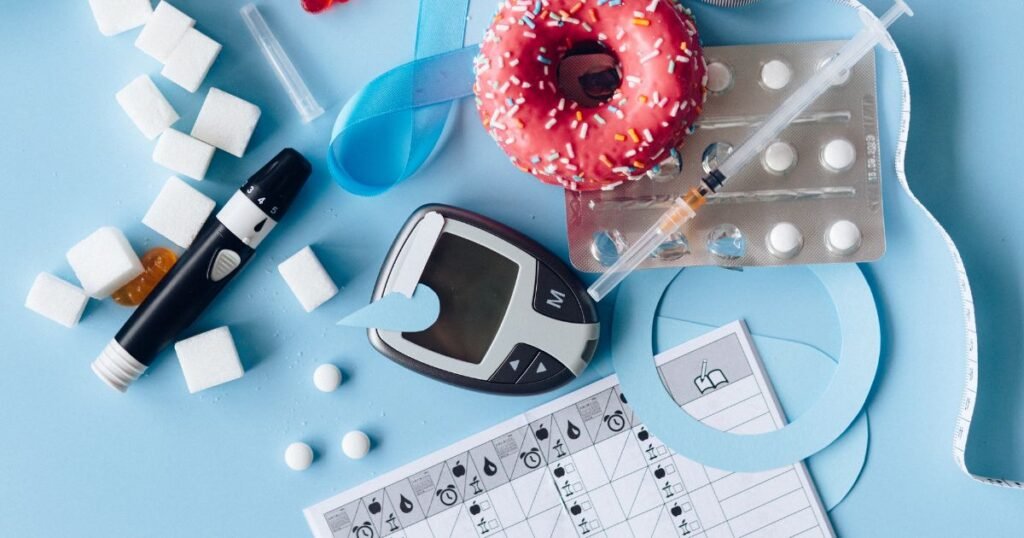Introduction
Living with diabetes requires constant attention to blood levels to maintain optimal health. Blood sugar, also known as blood glucose, is a critical aspect of managing diabetes. In this article, we will delve into the connection between diabetes and explore the importance of monitoring and controlling blood levels, and provide practical tips for effectively managing your diabetes.
Read More: Pancreatic Cancer

Understanding Diabetes
Diabetes is a chronic medical condition characterized by high levels of glucose in the blood. It occurs when the body fails to produce enough insulin or cannot effectively use the insulin it produces. Insulin is a hormone that regulates blood levels, allowing cells to absorb glucose for energy.
The Role of Blood Sugar in Diabetes
Bloods sugar, or blood glucose, refers to the amount of glucose present in your bloodstream. Glucose is the primary source of energy for the body’s cells. In individuals with diabetes, the regulation of bloods sugar is impaired, leading to elevated levels of glucose in the blood.
Types of Diabetes
There are three main types of diabetes: type 1 diabetes, type 2 diabetes, and gestational diabetes. Type 1 diabetes is an autoimmune disease where the body’s immune system mistakenly attacks and destroys the insulin-producing cells in the pancreas. Type 2 diabetes occurs when the body becomes resistant to insulin or doesn’t produce enough insulin. Gestational diabetes develops during pregnancy and usually resolves after childbirth.
The Link between Diabetes and Blood Sugar
Diabetes and blood sugar are closely interconnected. People with diabetes must carefully monitor their sugar levels to prevent complications. High blood levels, known as hyperglycemia, can lead to long-term complications such as heart disease, kidney damage, and nerve damage. On the other hand, low blood levels, known as hypoglycemia, can cause dizziness, confusion, and, if severe, loss of consciousness.
Monitoring Blood Sugar Levels
Regular monitoring of blood sugar levels is crucial for diabetes management. There are various methods available to measure blood including self-monitoring with a glucometer, continuous glucose monitoring systems, and laboratory blood tests. Monitoring helps individuals make informed decisions about diet, physical activity, and medication adjustments.

Managing Blood Sugar for Diabetic Individuals
To effectively manage blood sugar levels, diabetic individuals need to adopt a comprehensive approach. This includes making dietary changes, engaging in regular physical activity, taking prescribed medications or insulin, and maintaining a healthy lifestyle overall.
Dietary Considerations for Diabetes
A well-balanced diet plays a vital role in managing blood levels. It is important to focus on consuming whole foods, including fruits, vegetables, lean proteins, and whole grains. Limiting the intake of sugary foods, processed carbohydrates, and unhealthy fats can help control blood levels.
Physical Activity and Blood Sugar Control
Regular physical activity has numerous benefits for diabetic individuals. Exercise can help lower blood sugar levels by increasing insulin sensitivity, promoting weight loss, and improving overall cardiovascular health. Engaging in activities such as brisk walking, cycling, or swimming for at least 150 minutes per week is recommended.
Medications and Insulin Therapy
In some cases, diabetic individuals may require medications or insulin therapy to manage their blood sugar levels effectively. Medications may include oral antidiabetic drugs or injectable medications such as insulin. It is crucial to follow the prescribed treatment plan and consult with healthcare professionals for proper medication management.
Lifestyle Changes for Diabetes Management
Adopting a healthy lifestyle can significantly impact blood control. This includes maintaining a healthy body weight, quitting smoking, managing stress levels, and getting adequate sleep. Making positive lifestyle changes can improve overall well-being and help manage diabetes more effectively.

Tips for Preventing Blood Sugar Spikes
To prevent blood spikes, it is important to be mindful of the food choices and portion sizes. Opt for balanced meals that combine carbohydrates, proteins, and healthy fats. Avoid sugary beverages and processed foods, as they can cause rapid increases in blood levels.
Coping with Low Blood Sugar
In cases of low blood & sugar, it is important to act quickly to prevent complications. Consuming a fast-acting source of glucose, such as fruit juice or glucose tablets, can help raise bloods sugar levels. It is advisable to always carry a source of glucose with you in case of emergencies.
The Importance of Regular Medical Check-ups
Regular medical check-ups are essential for managing diabetes. Healthcare professionals can assess blood & sugar control, monitor potential complications, and make adjustments to the treatment plan if necessary. Routine check-ups also provide an opportunity to address any concerns or questions related to diabetes management.
The Impact of Stress on Blood Sugar Levels
Stress can have a significant impact on blood & sugar levels. During periods of stress, the body releases hormones that can raise blood & sugar. Therefore, practicing stress management techniques such as meditation, deep breathing exercises, or engaging in hobbies can help maintain stable blood & sugar levels.
Conclusion
In conclusion, blood control is paramount for individuals living with diabetes. By understanding the link between diabetes and blood monitoring blood levels regularly, adopting a healthy lifestyle, and following the prescribed treatment plan, diabetic individuals can effectively manage their condition and minimize the risk of complications.
Read More: Diabetes Blood Sugar
Frequently Asked Questions (FAQs)

Q: Can diabetes be cured?
A: Currently, there is no known cure for diabetes. However, with proper management and lifestyle changes, it can be effectively controlled.
Q: How often should I check my blood sugar levels?
A: The frequency of blood sugar monitoring may vary depending on the individual’s treatment plan and healthcare provider’s recommendations. It is typically recommended to check levels multiple times a day.
Q: Can exercise lower blood sugar levels?
A: Yes, physical activity can help lower blood sugar levels by increasing insulin sensitivity and promoting glucose uptake by muscles.
Q: Are there any specific foods that can help control blood sugar levels?
A: Foods high in fiber, such as whole grains, legumes, and vegetables, can help regulate blood levels by slowing down the absorption of glucose.
Q: Is gestational diabetes a serious condition?
A: Although gestational diabetes typically resolves after childbirth, it is essential to manage blood levels during pregnancy to prevent complications for both the mother and the baby.






